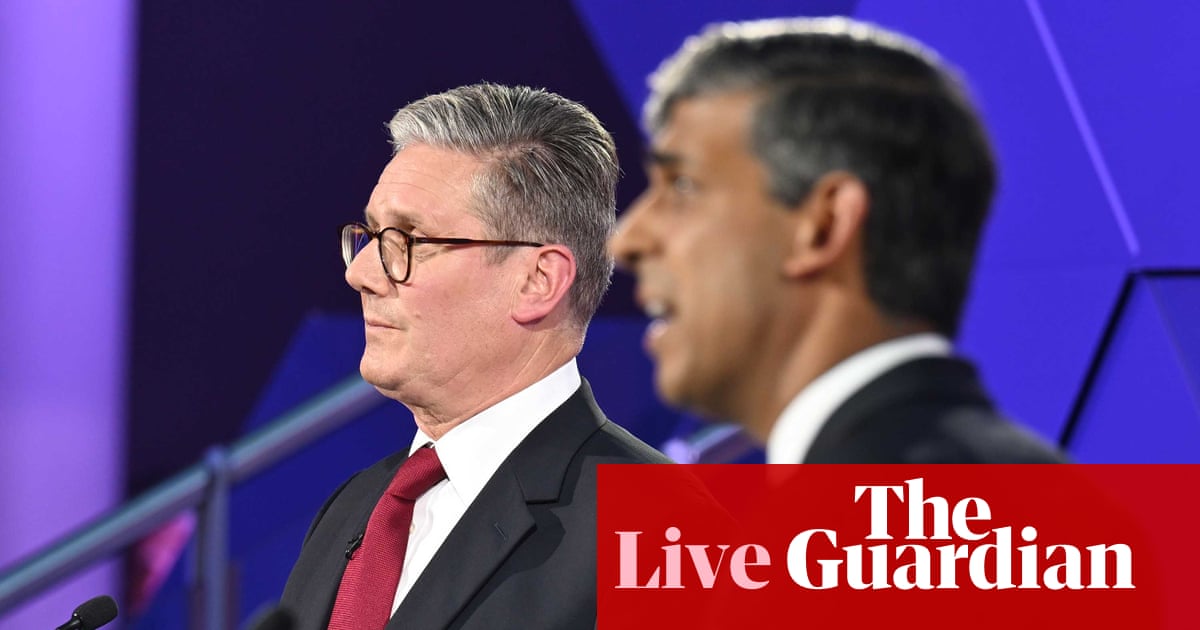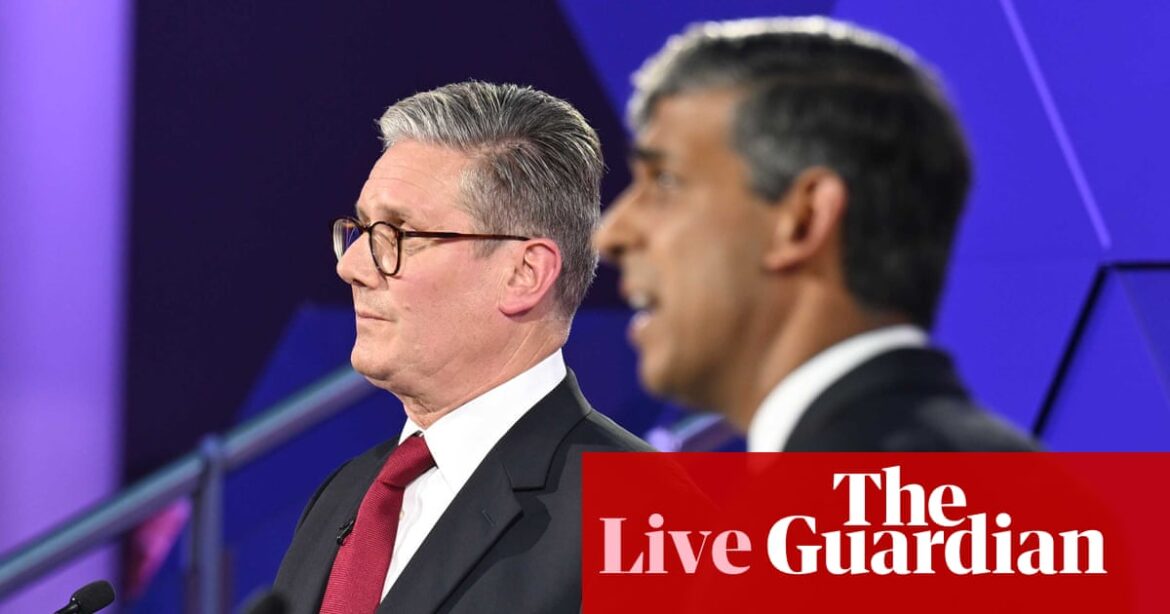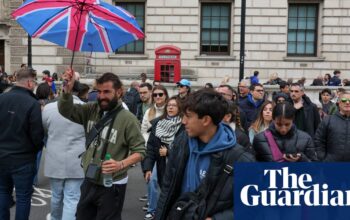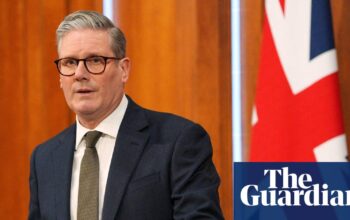
Starmer said he had suspended his candidate, Kevin Craig, “within minutes” of Craig admitting in a statement that he had placed a bet against himself winning the seat a few weeks ago.
Starmer was comparing his actions with Sunak, who took days to make the decision. “I think that in the last 14 years politics has become too much about self entitlement, and MPs thinking about what they could get for themselves,” he said.
“The instinct of these people to think the first thing they should do is try to make money, that was the wrong instinct, and we have to change that.”
He said Sunak had “delayed and delayed and delayed” and had been “bullied into” taking action. “My candidates know I have the highest standards. They have seen by my actions the consequences”.
Sunak meanwhile repeatedly urged voters not to “surrender” to a Labour government, using language Boris Johnson used when talking about Brexit.
“Do not surrender to the Labour party the control of our borders. If Labour wins, the people smugglers are going to need a bigger boat,” said Sunak.
More on the key developments from the debate soon.
Meanwhile here is what is coming up today:
9.30am Scottish Liberal Democrat candidate for Edinburgh West, Christine Jardine, is on the campaign trail in Edinburgh.
12pm: Nigel Farage in the North East, before a Reform event with Richard Tice in the evening.
2.30pm Scottish Labour leader Anas Sarwar to visit a health charity in Kirkcaldy with local candidate Melanie Ward.
3:10pm SNP Leader John Swinney on campaign trail in Edinburgh East and Musselburgh with SNP candidate for Edinburgh East and Musselburgh, Tommy Sheppard.
The Scottish Conservatives are on the campaign trail in East Lothian.
8.30pm: ITV interview with Keir Starmer
9pm: Northern Ireland leaders take part in a BBC debate
Filters BETA
the result was 50/50.
But later in the evening More in Common released polling suggesting Starmer was seen as the winner, by 56% to 44%. These are from Luke Tryl, More in Common’s UK director.
Who won tonight’s debate? @Moreincommon_ snap poll finds 44% saying Rishi Sunak and 56% say Keir Starmer
But some good news for Rishi Sunak, people were slightly more likely to say that he did better than they expected than said the same about Keir Starmer.
Impossible to know how much is partisan lean and how much is objective judgement of performance, but one crude comparison with general public’s choice of preferred PM shows Sunak outperforming that on “won the debate” by 8 points and Starmer under by 8.
A similar pattern emerged after the ITV debate near the start of the campaign. The immediate YouGov poll had Sunak as the winner, but only just, by 51% to 49%. But a subsequent Savanta poll had Starmer as the winner by 44% to 39% (or 53% to 37%, if don’t knows are excluded).
If you want to contact me, please post a message below the line (BTL) or message me on X (Twitter). I can’t read all the messages BTL, but if you put “Andrew” in a message aimed at me, I am more likely to see it because I search for posts containing that word. If you want to flag something up urgently, it is best to use X; I’ll see something addressed to @AndrewSparrow very quickly. I find it very helpful when readers point out mistakes, even minor typos (no error is too small to correct). And I find your questions very interesting too. I can’t promise to reply to them all, but I will try to reply to as many as I can, either BTL or sometimes in the blog.
Shadow education secretary Bridget Phillipson is on the Today show. Asked about funding for universities, she says:
”Our universities are a brilliant success story… We will have to stabilise the sector. We will make sure that once again our universities are treated as the engines of growth,” and that Labour will have a “different relationship with universities”.
It isn’t much of an answer.
“They want money,” says Nick Robinson, and Phillipson returns to the Tory record on universities.
With that vague response, I’m handing over to dean of this blog, Andrew Sparrow.
MRP models, the Conservatives will win about 50 seats at next week’s election. Then again, some pollsters using the same method believe they are heading for closer to 200 seats. The same models show Labour heading for somewhere between 375 and more than 500 seats.
One reason for the huge variation in seat predictions is that people are preparing to vote tactically in historic numbers, encouraged by two opposition parties that have all but abandoned campaigning in each other’s target constituencies.
A poll by Ipsos on Wednesday showed that nearly one in five voters say they are planning to vote for a certain party not because they support it but because it is the one most likely to defeat the Conservatives where they are. That is more than any other general election campaign on record, when the numbers doing so tend to be between 10 and 12%.
Keiran Pedley, a pollster at Ipsos, said: “Tactical voting is set to be more widespread than normal, which is why the Conservatives are doing so badly in some seat projections. If you want to predict the scale of the Conservative defeat, you have to understand the impact of tactical voting.”
Kiran Stacey and Aletha Adu report:
David Tennant’s comments after the actor told equalities minister Kemi Badenoch to “shut up” in a row over trans rights.
Bridget Phillipson told Times Radio:
I personally don’t like that kind of language that was used.
And I believe that where we discus these issues – and it is right that we can have an open discussion about them – that we do so in a way that is absolutely frank but respectful, tolerant, and in keeping with the best traditions within our country.
And I know that politicians, particularly female politicians, receive an awful lot of abuse sometimes and do frequently face that kind of language being used against them and I don’t think it advances a more tolerant and respectful discussion.”
latest junior doctors’ strike is “interesting”.
Asked whether striking in the final week of an election campaign was “deliberately provocative”, Hollinrake told Sky News:
It’s interesting timing, it really is. There’s not been a strike for some time.
I don’t know, I’m not going to judge somebody’s motivation for a decision but it’s interesting timing and I regret the decision to strike because we know this doesn’t help waiting lists, which we want to bring down.”
projections of historic – even unprecedented – results, people cannot always be relied upon to give their full attention.
“We met a guy who said he was going to vote Labour but wouldn’t now because he had just heard that we were taxing condoms,” said Labour’s Karl Turner, who was first voted in as the MP for Hull East in 2010 and is standing for re-election this time.
“I said, ‘condoms?’ ‘Yeah,’ he said: ‘I just heard on that [pointing to the TV] that you are taxing condoms, and I’m not having it. You’re not getting my vote.’ It was Terence [Turner’s parliamentary assistant] here who worked it out.
“‘We’re taxing non-doms, not condoms,’ I said. ‘Oh,’ he said. ‘Like the prime minister’s wife? Ah.’ He calls out: ‘Margaret: they’re taxing non-doms, not condoms.’”
It was one vote saved for Labour in East Yorkshire – but as the general election moves from what observers have described as the “air war”, where messaging is all-important, to the “ground war”, where mobilising the voters to actually visit the ballot box is key, it is the significant tranche of voters who have entirely switched off that worries Turner.
Hull East was the only constituency at the last general election where under half (49.3%) of the electorate turned out to vote. Within Turner’s constituency is the ward of Marfleet, which has a strong claim to be the most politically disillusioned place in Britain. Turnout was 11.6% in the last local elections.
Disillusionment and distrust when it comes to politics and politicians is a UK-wide phenomenon, and is strong in Hull East.
miles behind.
There are two caveats. While Sunak may have done well in terms of scoring debating points, he sounded increasingly like the sort of oddball that you would least want to be standing next to at a party. When he seemed nervous, or was facing challenge, his speaking rate starting speeding out and he began to get shouty and a bit monomaniac. Even if he had a point, it was not endearing.
And the other caveat, of course, is that it is too late for any of this to make any difference – which may be why there was a thread of desperation running through the Sunak performance.
If Sunak won on policy, Starmer won, very easily, on demeanour. He was more effective than he was in the first debate at pushing back at Sunak’s propagandist claims, and he delivered what was probably the best put-down of the night: Starmer said if Sunak listened to people around the country, he would not be so out of touch. He was not afraid to accuse Sunak of lying, but he managed to come over as less petty than his opponent, and more authoritative and likable.
Sunak may have won in that he outperformed expectations. But Starmer presented as the next prime minister, and all he needed was a draw anyway; in that sense it was a win for him too.
growing issue in the election, it is worth looking back at this explainer by my colleague Archie Bland of the current government’s guidance for schools on youth transition.
In December last year, Bland writes:
The government finally published its long-delayed guidance for schools on youth transition. The document promises a clear set of principles for teachers and staff as they wrestle with the needs of children who are questioning their gender identity. According to the education secretary, Gillian Keegan, the guidance “puts the best interests of all children first”.
But while the guidance has been broadly welcomed by those who believe that it is currently too easy for young people to “socially transition” at school, there are others who disagree vehemently. They see the government’s approach as informed by an underlying hostility to trans people, and scepticism about whether they even exist. And although the guidance does not include an outright ban on allowing social transition (said to have been under consideration until it was found to be unlawful), it clearly creates new barriers for teenagers who want to talk to teachers about their gender without fear of being outed at home.
Central to criticisms of the government’s approach is a view that it takes a highly controversial set of positions about the best way to support children it calls “gender questioning”, and presents them as unimpeachable facts:
Gambling Commission, which has been investigating multiple suspicious bets on the election date, and Scotland Yard have been continuing for days.
A formal announcement is expected as soon as Thursday but exact details are still to be hammered out, with the row around the scandal engulfing Rishi Sunak’s election campaign showing no sign of abating.
A Scotland Yard spokesperson said: “The Met is not taking over the investigation into bets on the timing of the general election.
“The Gambling Commission will continue to lead the investigation into cases where the alleged offending is limited to breaches of the Gambling Act only.
“Met detectives will lead on investigating a small number of cases to assess whether the alleged offending goes beyond Gambling Act offences to include others, such as misconduct in public office.”
Source: theguardian.com



